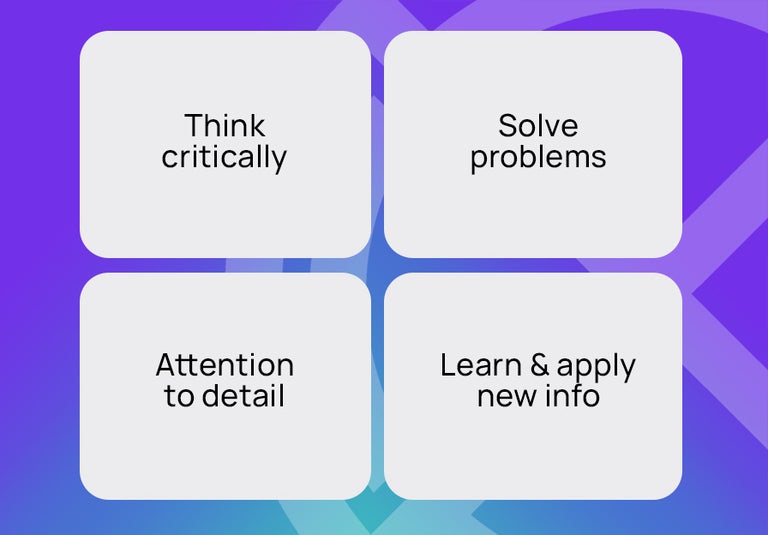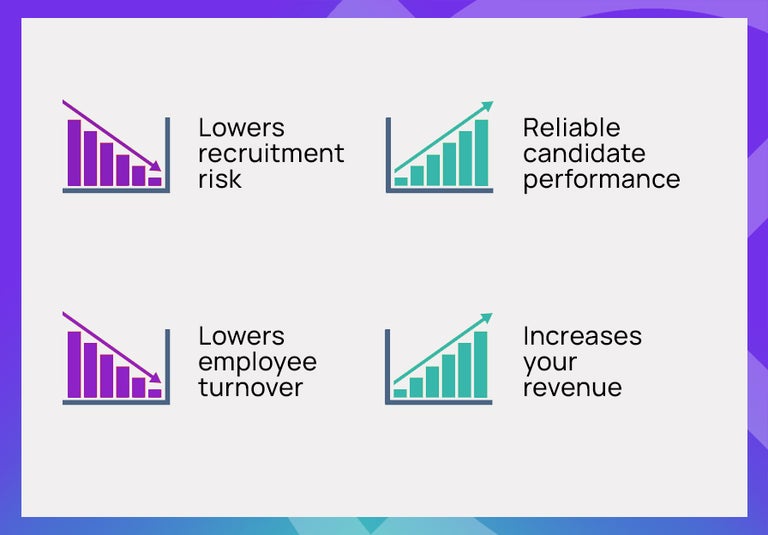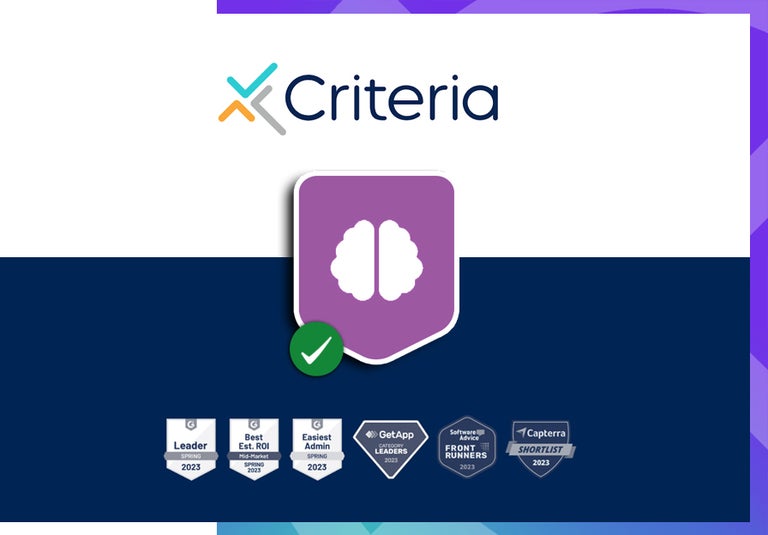Contents
- What is Crossover's Cognitive Aptitude Test?
- What is Cognitive Aptitude?
- Why Do Companies Use The Criteria Aptitude Test?
- Is Cognitive Aptitude Innate or Can You Acquire it?
- Can You Study for a Cognitive Aptitude Test?
- Where Does the Criteria Cognitive Aptitude Test Come From?
- Why Does Crossover Use the CCAT Test?
- Is it Possible to Pass the CCAT Test?
- Is the Cognitive Aptitude Test Timed?
- What is Tested in The CCAT Assessment?
- How Do I Pass the CCAT Test?
- What Score Do You Need on the CCAT for Crossover?
- What is a Good CCAT Score?
- Can You Still Get Hired if You Fail an Aptitude Test?
- What is the Highest CCAT Score?
- Why Do I Have to Wait 6 Months to Retake the Test?
- Can I Reuse My CCAT Score for Another Application?
- Who Shouldn’t Take the Crossover CCAT Test?
- Does Crossover Charge People to Take the Test?
- Does Crossover Offer Study Consultations for the CCAT?
- Does Crossover Have a Fair Testing Process for Everyone?
- What is The Proctored CCAT Test?
- Acing Crossover's CCAT: Final Pro-Tips
High scorers on the cognitive aptitude test are 7X more likely to be high performers.
Are you our next high performer?
You’re interested in a position we’ve advertised and you’re confident that you’re a perfect fit. The only thing standing between you and the job of your dreams is the CCAT assessment.
But do you know how to prepare for the CCAT test? Before now, your only option was third-party guides with unreliable and downright bad advice.
That changes today!
This is the official guide to preparing for Crossover’s Cognitive Aptitude Test. It’s the only CCAT guide we’ve ever created, and the only one that has our full endorsement.
That means you’ll learn what we expect from you as you prepare, what the rules are, and how you could end up breaking them if you’re not careful.
This study guide is where you’ll get the most accurate information, written by people who have passed the test and gone on to be hired on Crossover.
It’s what you’ve been waiting for!
Here’s how this study guide will help:
- It’s everything you need to know about the Crossover CCAT exam
- Get a concise summary of what’s inside the test
- Prepare with cognitive test questions
- Formulate your strategy for passing the test
Fifty questions in fifteen minutes – do you have what it takes?
Let’s begin.
What is Crossover's Cognitive Aptitude Test?
The Criteria Cognitive Aptitude Test (CCAT) is a general intelligence test proven to predict high job performance more accurately than almost any other datapoint.

It measures your ability to:
- Think critically
- Solve problems
- Apply attention to detail
- Learn, understand and use new information
What is Cognitive Aptitude?
Your cognitive aptitude is your ability to quickly learn new things, reason and solve problems.
The test assesses a collection of your intellectual skills - the ones that govern decision-making and cognitive flexibility.
Among other mental competencies it measures:
- Memory
- Attention
- Perception
- Visual and spatial processing
A cognitive ability test is not the same as an IQ test, an EQ test or a personality assessment.
There are a lot of tests out there that add a piece of the puzzle to a candidate’s profile. Though the CCAT is in good company, it’s different from the others in its predictability.

Cognitive aptitude tests are the only candidate tests that are incredibly effective in predicting candidate performance in the long-term.
And this is because they’re based on objective information – the kind that isn’t measured correctly using methods like resume screening, interviews or background checks.
Instead, the test looks at how a person processes their surroundings and makes sense of things.
This helps employers answer questions about how well you would do your job.
Everyone has a cognitive aptitude that has absolutely nothing to do with their level of education, job experience or niche expertise.
This objective perspective on a candidate’s mental capability is a reliable measure of potential job success. No other testing method can make this claim.
Why Do Companies Use The Criteria Aptitude Test?
The CCAT test is an incredible discovery tool for companies searching for perfect-fit hires.

- It lowers recruitment risk
- Used to find people who can reliably perform
- Lowers employee turnover
- Increases revenue
Employers have wanted a way to predict job performance for a long time. That’s why there’s over 100 years’ worth of collective research on the subject!
What researchers discovered was that cognitive aptitude testing is radically better at predicting job performance in candidates, than things like interviews or job experience.
The Cognitive Ability Test for Employment
Every employer is looking for a candidate with qualities that signal they’re a great hire. Recruitment is a risky business, and the cost of bad hires can be crippling in tech.
When companies use the CCAT assessment, it helps them determine if a candidate has what it takes to learn, adapt, problem-solve and make good decisions in their position.
And the higher you go, the greater the predictive accuracy with Criteria test results.
That’s because abilities are measured that are specific to job performance. Leadership, autonomy, vision, independent decision-making – these are critical on-the-job skills.
When companies use the Criteria assessment test (CCAT), it gives them confidence that they’re hiring people who can produce results.
Is Cognitive Aptitude Innate or Can You Acquire it?
Walter Bingham, a big name in industrial psychology and intelligence testing during the Second World War (and author of the classic “Aptitude and Aptitude Testing”) believed that aptitude measured a person’s shot at being successful.

Beyond capacity, it’s the sum of your potential combined with your innate ability and suitability in performance. So, it’s not just about your innate disposition - but your willingness to develop those abilities through experience.
We’re talking about latent potentialities here.
Cognitive aptitude is only one kind of aptitude – but it’s both innate and incrementally acquired.
Can You Study for a Cognitive Aptitude Test?
As the previous question implies... yes and no.
The test itself is designed to measure your current cognitive ability, and there is no way to immediately improve that. Cognitive improvements happen over a period of months, not days (which is why there's a six month waiting period for candidates who don't pass).
You CAN prepare by familiarizing yourself with the types of questions, so you know which parts of your brain will be stretched, and how much time you have per question (spoiler alert: not much!) Understanding the format will help calm your nerves, and sharpen your performance so the test result reflects your actual cognitive aptitude.
This is the only practice CCAT site which is approved for Crossover candidates to prepare before the test.
It's completely free, and ethical because it doesn't hand out stolen or fake answers - just helps you practice the right kind of mental agility. To be clear: ALL other test prep sites are banned, and NONE are affiliated with Crossover (including that one).
If you still want to prepare further, be careful: some CCAT test prep sites falsely claim to be affiliated with Crossover, and scam people into paying real money for fake 'study packs'.
Crossover applications have always been 100% free of charge and we strongly advise candidates never to pay for any kind of application assistance.
Candidates who use these sites are more likely to get blacklisted than hired, and even 'real test screenshots' will not help you pass because test questions are randomized from a large bank that gets frequently refreshed, so memorizing answers is not a viable strategy to beat the system.
Where Does the Criteria Cognitive Aptitude Test Come From?
The CCAT test was created by a leader in psychometric testing: a company called Criteria.
Like us, they believe in evidence-based talent and using tests like these to reduce bias and improve team performance.

- Inc. Recognized them as a Best Place to Work
- They have 4500+ companies using their assessments
- The tests are certified and data compliant with all major global regulations
Why Does Crossover Use the CCAT Test?
Picture this: A world where the best talent, irrespective of their geographical location, educational pedigree, or socioeconomic background, can shine through and get noticed for their innate abilities.
In the diverse tech world of today, where innovation knows no bounds, isn't it time we leveraged modern tools to tap into this pool of potential?
That’s why we use the Criteria Cognitive Aptitude Test (CCAT).
Redefining Job Compatibility
Traditional hiring methods might involve extensive reviews, screenings of resumes, or even multiple rounds of interviews. While these processes have their merits, Crossover uses a method that's backed by decades of research: the CCAT.
This test isn’t just another hiring fad - it's a scientifically validated tool that predicts job performance with uncanny accuracy, ensuring we match you to roles where you're most likely to thrive.
Beyond Predictive Value: The CCAT Advantage
- Championing Diversity and Inclusion:
At the heart of Crossover's mission is a commitment to eradicate hiring biases. The reality of the past showcased biases leaning toward familiar educational institutions, workplaces or experiences. But we believe that true talent is borderless.
With the CCAT, we’re laying the foundation for a meritocratic hiring landscape. Whether you're from an Ivy League school or a lesser-known global university, your cognitive abilities shine through, leveling the global playing field.

- The Global Talent Olympics:
Much like athletes are vetted for the Olympics, we aim to find candidates that excel on a global stage. It's rigorous, but that’s what makes it valuable. The CCAT is our gold-standard, ensuring we get the very best, from every corner of the globe.
- Respecting Your Time:
The world of tech hiring can be daunting, with seemingly endless rounds of interviews and evaluations. We've streamlined this process. The CCAT takes a mere 15-30 minutes of your time and swiftly provides feedback on your compatibility with our roles.
It's all about ensuring you spend time where it matters most.
The Proof is in the Results
Research doesn't lie. The CCAT has proven to be:
- 1.6X more predictive than conventional interviews
- 4X more indicative than mere job experience
Candidates who pass the CCAT are not just job-compatible - they are primed to excel, learn swiftly, and create a significant impact. They're a testament to a global talent pool's potential.
Redefining the Future of Hiring
In the AI-driven tech era, it's about time our hiring processes evolved too.
Crossover's CCAT assessment is a rebellion. As we stand on the cusp of this new age, we invite you to be a part of this transformative journey.
Your cognitive aptitude badge awaits.
Is it Possible to Pass the CCAT Test?
Yes, it’s possible to pass the Crossover CCAT test – with flying colors!
It’s also true that only 1% of candidates who take the assessment answer all the questions and complete the test. Because of that most people don’t pass.
The average score is 24/50 but it won’t get you a Crossover job.
The CCAT is known as one of the most challenging pre-employment tests to pass. It’s not just your ability to answer these questions that matter but your ability to answer them at lightning speed.

Everyone here at Crossover has passed the test, and everyone hired through us has passed it too – that’s thousands of people who have succeeded.
Here are some of their stories.
Is the Cognitive Aptitude Test Timed?
You’ll have 15 minutes to answer 50 questions.
It’s fast.
This is the most challenging part of the CCAT – having to answer questions at speed. It reduces the chance of cheating during the test, and surfaces people who can think quickly and make strong decisions in a hurry.
- An average of 18 seconds per question
Assuming it takes time to read and understand each question, you’re left with a few high-pressure seconds to extrapolate the most accurate answer from the answer set.
Before doing the official test, you are allowed CCAT test practice in our system to get used to the speed.
If you feel you need more test prep you get it here.
What is Tested in The CCAT Assessment?
Here are some cognitive testing examples for orientation.
The questions test three areas:
- Verbal reasoning
- Math and logic
- Spatial reasoning
Verbal Reasoning:
Verbal reasoning questions in the CCAT test your ability to communicate.
- A word’s meaning
- How words relate to each other
- The role of context in word associations
These questions focus on assessing your attention to detail, your understanding of antonyms, being able to correctly choose words to create the right context in a sentence, and to identify the relationship between words to find the same relationship in the answer set.
Example Q1: Opposite Words
Choose the word that is most nearly opposite to the word in capital letters.
LACKADAISICAL
- Uncaring
- Languorous
- Zealous
- Empty
- Whimsical
Answer: 3 / Zealous. Lackadaisical means lacking enthusiasm, so zealous which means showing great enthusiasm is the closest opposite word.
Example Q2: Pick the Right Context Words
Complete the sentence to give it the most accurate meaning.
The daughter _________ the father, which made him __________ with rage at her deeply hurtful public betrayal on his birthday.
- Bamboozled, apoplectic
- Infuriated, content
- Saved, bilious
- Struck, propitious
- Beloved, disconsolate
Answer: 1 / Bamboozled, which means tricked, works best in this context along with the word apoplectic, which means overcome with anger. None of the other word combinations fits as well within the context of the sentence.
Math and Logic Questions:
Numerical reasoning questions test your ability to use numbers for critical thinking and problem-solving. In tech, no matter your job role – having solid logic skills is essential.
- Basic algebraic equations (fractions, probabilities)
- Ability to determine proportions (percentages)
- Numerical word problems
These questions don’t test your math literacy, instead they focus on seeing if you can quickly understand the formula to solve the problem presented.
These come in the form of direct math questions, word problems, chart-based math problems and number sequences. You’ll also be asked to evaluate syllogisms to test your critical thinking skill.
Example Q1:
A group of 4 numbers has an average of 23. The first three numbers are 23, 16 and 8. What is the fourth number?
- 92
- 50
- 44
- 45
- 23
Answer: 4
Average = sum of numbers / quantity of numbers
Solve for X:
(23+16+8+X) / 4 = 23
23x4 = 92
(23+16+8+X) = 92
92-47 = 45
X = 45
Example Q2:
108 is 30% of what number?
- 388
- 324
- 360
- 408
- 458
Answer: 3
0.30x = 108
X = 108 / 0.30
X = 360
Example Q3: Syllogisms
Assume the first two statements are true. Is the final statement 1) true 2) false or 3) uncertain based on the information provided?
Open-toed shoes are not allowed in Ben’s martial arts class in the East Village. Only the teacher and assistant teachers are permitted to wear them.
Mario is an assistant teacher in Ben’s martial arts class in the West Village.
Mario is allowed to wear open-toed shoes during class.
- True
- False
- Uncertain
Answer: Uncertain.
We know Mario would be allowed to wear open-toed shoes at Ben’s class in the East Village, because he is an assistant teacher. But we don’t have enough information to say for sure that Mario is allowed to do this in the West Village. The statement is therefore uncertain.
Spatial Reasoning:
Spatial reasoning questions test your ability to learn new information and solve problems on the go.
- Image rotation or flipping
- Pattern identification
- Pick the one that doesn’t belong
These questions are straightforward, asking you to pick the next logical shape in a sequence, to find the shape or pattern that doesn’t fit with the others, and to complete a pattern matrix.
Example Q1:
Which of these does not belong?

Answer: B
Identify the outlier. Each shape set has a circle, a square and a triangle except for B. Because it’s the only one that has two squares it’s the outlier and does not belong.
How Do I Pass the CCAT Test?
1. Answer The Questions Fast
Criteria’s cognitive aptitude test gives you an average of 18 seconds per question. That doesn’t mean you’ll use all 18 seconds for every question. Answer easy questions as quickly as possible to stack time for the more complex questions later on.
2. The Questions Graduate in Difficulty
The CCAT assessment starts easy and gets harder as you go. The most difficult questions that take the most time are towards the end. Make sure your easy questions are fast and correctly answered.
3. Skip Questions You Get Stuck On
There isn’t any time to get stuck on a question you can’t figure out fast enough. It makes strategic sense to move on if you’ve become confused or stuck – instead of sacrificing time on other questions you could have answered.
Remember, few people finish all the questions and you don’t lose points if you get a question wrong.
4. Play to Your Strengths
Some candidates will be strong in math and logic, and weaker in verbal reasoning. Or they may excel at spatial and verbal reasoning but can’t answer the math questions as quickly as they’d like.
You can pass the test by focusing your time on your strengths, and skipping the questions that you can’t answer effectively within the given limitations.
5. Practice Pen and Paper Solves
If you’re a bit rusty with equations on paper, a few basic problems to get you back up to speed is all you need. You’re not allowed to use a calculator during the test, but pen and paper is allowed.
It benefits you to sharpen your pen and paper solves, because if you pass the test and get hired – you’ll have to pass a proctored test where someone watches you do another CCAT live, and that is 100% cheat proof.
6. Don't Start Until You're Ready
Think of CCAT like a university entrance exam: you only get one shot. While occasionally a second attempt will be granted, this will only happen if your first score comes very close to the passing threshold. So it's very important that you do the best you can on the first attempt! Don't start until you know you can dedicate the next 15 minutes to answering as many questions as you can, without any distractions or interruptions.

What Score Do You Need on the CCAT for Crossover?
At Crossover, different positions require different scores. The passing grade is set by the hiring manager.
Most often, a baseline score of 35/50 is the lowest possible passing grade to move onto the next stage of testing. Achieving it puts you in the 85th percentile, which means only 15% of applicants scored higher than you – and you outscored 85% of test-takers.
The most senior positions require higher scores, so aim high!
What is a Good CCAT Score?
A good CCAT score is anything above the passing grade for the position you’ve applied to. If you’re aiming for the top, 43/50 and above is considered excellent.
Can You Still Get Hired if You Fail an Aptitude Test?
Yes, and it happens all the time... just not right away. There's a 6-month cooling off period because cognitive aptitude is not the kind of trait that changes overnight.
Many applicants who fail CCAT on their first application go on to pass six months later, and some even get hired. Persistence is a positive trait we admire in candidates.
What is the Highest CCAT Score?
A score of 50/50 is the highest CCAT score, but it doesn’t happen often!

Why Do I Have to Wait 6 Months to Retake the Test?
Crossover’s assessments measure your natural ability, not what you know. So, you can't really prepare for them by cramming at the last minute.
While scores might not change much from one day to the next, they can improve over a longer period if you learn new skills. That’s why we ask you to wait six months before retaking an assessment.
Can I Reuse My CCAT Score for Another Application?
Of course! Your CCAT score badge is valid for six months and can be used for any new job application. There's no need to retake the test if you've recently done it.
If you reached the final stages of an application but didn't get the job, we highly recommend trying for a similar position with your existing score.
Who Shouldn’t Take the Crossover CCAT Test?
It’s important that applicants know what they’re getting into with the CCAT testing process. Though this information is widely available, it’s not accessed as often as we’d like.
Please don’t take the test if ANY of the scenarios ring true for you.
- Applicants who are against testing: Crossover believes in science-based hiring and using tests like the CCAT and other skills-based assessments to surface extraordinary talent. We’ve done the research and this is the most accurate way to find exceptional people. If you don’t want to be tested, and don’t agree with testing - we’re not the company to apply to.
- Applicants who can’t manage failure: The fact is, 99% of test takers don’t finish the test. Some still pass it, but others fail and then they get SUPER upset. The majority of our 1.6 Trustpilot score is because of people who don’t want to be tested, or who fail the tests.
Bottom Line: applying to Crossover is like applying to Harvard: less than 1% get in.
Before doing the CCAT or any of our other tests, consider that the likelihood of failure is high. This is by design – we’re looking for the top 1% which means most people won't make it.
- Applicants who plan to cheat: Some applicants believe that cheating is the only way to pass the cognitive aptitude test. Here’s the thing, it’s going to waste everyone’s time if you cheat and get hired. Every applicant does a proctored CCAT on hire, and if your scores show a big difference, you are dismissed and banned from ever applying again.
Does Crossover Charge People to Take the Test?
Absolutely not!
Crossover CCAT tests are 100% free, and always will be.
Over the years there have been many third-party individuals or companies who have claimed to be affiliated with Crossover, and have ‘guaranteed’ passing grades in exchange for fees or payments of some kind. Some of these platforms even claim to offer free practice CCAT tests, or study guides.
These are scams and will get your application disqualified.
- You are reading the ONLY official CCAT study guide
- Crossover has no affiliation with any other CCAT study guides or practice tests
- Engaging with the majority of third party CCAT materials is equivalent to cheating, and will immediately disqualify any Crossover application
- The only third party exception is 12minprep.com
- Never pay money for a CCAT test or study guide
Does Crossover Offer Study Consultations for the CCAT?
No, because cognitive ability is not something you can study for in a traditional sense. Because of that, the majority of prep tests, live consultations or e-courses can only artificially improve your grade.
So we don’t offer them.
The goal of the test is to assess your current cognitive aptitude.
It’s not meant to require a ton of study or physical preparation.
We discourage applicants from investing in unethical resources as they often amount to cheating. If any cheating is discovered (and it will be), if you’ve been hired you will be dismissed.
These services also cause us harm, by making false claims and promises to applicants who then experience massive disappointment when they don’t pass.
Does Crossover Have a Fair Testing Process for Everyone?
At Crossover we adamantly believe in equal opportunity for everyone. Our goal is to build a completely unbiased assessment system that gives every candidate a level playing field to prove what they're capable of.
That said, we understand that standardized testing isn't perfect, and some candidates may need extra accommodations in order to receive equitable treatment. We are committed to providing reasonable support wherever possible. For example, candidates with visual impairment can access an adapted version of the CCAT that doesn't include any visual questions. In other cases, extra time can be granted.
If you require support to take a Crossover assessment, you can request assistance via Crossover's support bot 'Crosby' here or by clicking the 'need help' widget on your Crossover profile. The explanation that you provide Crosby will be reviewed by a human support agent, and where possible, reasonable accommodations will be granted on a case-by-case basis.

What is The Proctored CCAT Test?
If you pass the Crossover testing process and get a job offer – you’ll be asked to complete a proctored version of the CCAT test under strict exam conditions.
We’re serious about hiring truly talented individuals, and this is a necessary step to prevent cheaters from getting in.
Accurate proctoring is so costly and labor-intensive that we’re not able to offer it for every single CCAT taker, but it is necessary to ensure that candidates who attempt to cheat the system cannot get in.
(So seriously, it’s not worth trying! You’ll waste a lot of time and won’t get anything out of it)
Acing Crossover's CCAT: Final Pro-Tips
To truly excel in the Crossover cognitive aptitude test, consider these vital steps:
- Rejuvenate with a restful night’s sleep
- Stay hydrated for peak brain performance
- Secure an undisturbed environment for that crucial 15-minute window
Remember, our system is meticulous. Any deviation - be it a simple pop-up or an internet glitch - might be misconstrued as an unfair advantage. Maintain laser-focused attention and ensure that those 15 minutes are genuinely interruption-free.
If the stars don’t align the first time, don’t be disheartened.
The measure of a genuine leader is not in their victories, but in their resilience.
Falling and rising is part of the journey. If you're destined to be with us, you'll overcome these barriers and will shine the next time you try.
Let’s redefine what it means to be the best, together.
Do you have what it takes?

![The Crossover Cognitive Aptitude Test [Official CCAT Guide]](https://assets-us-01.kc-usercontent.com:443/7beb5311-75a4-0049-50f5-8f58fd55aba7/57f22476-19f4-4309-a615-a27b35061cda/CCAT_Guide_Header2.jpg?fm=jpg&auto=format&w=800&h=500&fit=clip)




